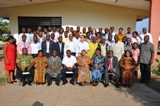 GHANA SCHOOL FEEDING PROGRAMME: Way Forward
GHANA SCHOOL FEEDING PROGRAMME: Way Forward

The rapid growth of the programme has not been accompanied by robust management structures, according to S.P. Adamu, GSFP National Coordinator. The lack of adherence to the carefully written original programme document has led to several issues and challenges. Government’s efforts to address these issues include the 2009 Social Accountability Project aimed at holding key actors responsible for the programme’s success.
In 2011, the programme was reviewed and re-organised so that the neediest schools would be served by SEP. the review process revealed the need for GSFP to have a strong legal and policy framework aligned to the national public administration structure. With document review and stakeholder consultations completed, regional policy formulation consultations were held throughout May to seek input from the beneficiaries and sector workers most directly affected by the programme.
The consultations averaged almost 200 participants in each region including District Chief Executives (DCEs), regional directors of health, education and agriculture (or their representatives), district assembly members, teachers, caterers, school children, farmers, and members of the general public.participants were very passionate and vocal about thee pgoramme’s issues and challenges, and have also contributed many suggestions for improving the progrmme.
Caterers were the most outspoken group of SFP beneficiaries at all shops. Some of their challenges include the partial and delayed payments for their services, low feeding fee per child (50p per day), 5% tax levied by the district assembly, as well unregistered children coming to SFP schools to be fed. The buffer stock rice used for the programme came up in all regions, with caterers complaining that some teachers and parents incite the children to refuse the local rice on credit was a good scheme, they were unhappy about full payments for rice being deducted from their partial SFP payments, which increased their financial burden. One caterer in Kumasi threatened to withhold his services until all arrears have been paid in full.
It is evident from the caterers’ issues that many challenges facing SFP are financial, so the organizers were particularly interested in obtaining suggestions on sustainable financing from participants. Participants noted that bank interest rates of almost 40% are punitive, and called for access to loans at government banks with lower interest rates to ease caterers’ financial burden. Other financing options discussed include 0.5% of District Assembly Common Fund to SFP, a talk tax on mobile communications, oil fund, MASLOC, SSNIT, royalty payments to traditional authorities and the use of the 5% caterer tax solely for SFP. Other innovative suggestions called for an annual fund-raiser as done by religious organizations, a percentage of airport tax, a percentage of foreign visa applications fees, and a seed fund. One suggestion in Cape Coast that garnered approval from several other participants sought immediate financial relief by having the government obtain low interest loans for intermediary financial institution from development partners. Caterers would then be guaranteed monthly payments and suffer fewer financial problems.
Institutional collaboration is a key factor to the long-term success of SFP. For effective collaboration, participants asked that institutions be given clearly defined roles in order for them to make meaningful contributions to SFP. Other suggestions include requiring DCEs to call quarterly meetings with health, education, and agric officers to get updates from all sectors, regular payments to incentives agric officers to do more and acquisition of 50 to 100 acres of land in each district for Ministry of Agriculture to grow produce for SFP and local communities. Participants also suggested that School Health Education Programme (SHEP) coordinators and Women in Agricultural Development (WIAD) officers be incorporated in monitoring the programme.
A recurring concern in all ten regions was the politicization of the Ghana School Feeding Programme. According to participants, some caterers behave with impunity due to their perceived political clout. Some DCEs also ban monitors from doing their work in certain districts because of their political power. There were even suggestions that teachers and head teachers, in wanting the programme to fail for political reasons, urge pupils to refused food served by caterers and complain about the quality of the rice used in meals. Participants therefore urged the government to ensure that the programme is completely de-politicized in order to serve all target beneficiaries equally.
The policy formulation tour generated valuable suggestions and innovative ideas on building a robust and sustainable school feeding programme. Participants across the board were passionate about the school feeding programme and wanted it to be a success. They were all hopeful that their suggestions and feedback would be used to craft a strong, multi-faceted policy that would address the challenges plaguing the programme currently and create a better educated, healthier, an wealthier nation.



